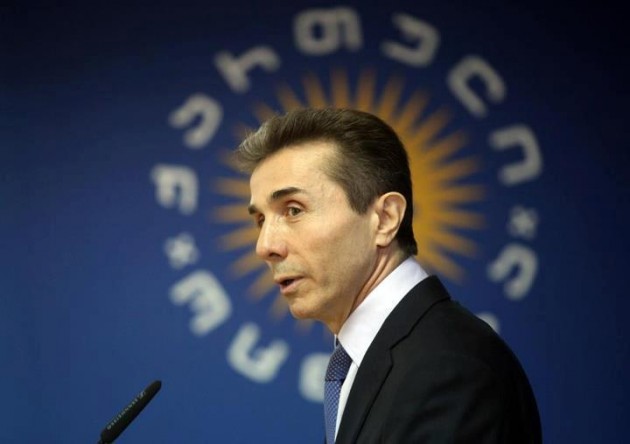
Georgian Dream Opposition Leaders Envisage Post-Election Confrontation
Publication: Eurasia Daily Monitor Volume: 9 Issue: 134
By:

From the outset of his political project (October 2011) to date, Georgian Dream movement’s billionaire leader Bidzina Ivanishvili has expressed total confidence in winning the upcoming parliamentary and presidential elections. Before long, Ivanishvili and his allies were implying that the government could only win through fraud, and the opposition’s defeat would in itself prove that the elections were rigged. Borrowing from the radical opposition’s logic in the preceding elections (January 2008 presidential and May 2008 parliamentary), Georgian Dream leaders seem to claim victory in advance and urge their supporters to “defend their votes” through street demonstrations in the elections’ aftermath. These tactics, when previously used by the radical opposition, led to tumultuous scenes in Tbilisi during the months preceding Russia’s invasion.
Ivanishvili’s dependent ally, Irakli Alasania, became the first to warn publicly that Georgian Dream would not recognize the parliamentary elections’ outcome – and would ask the “international community” to do likewise – unless the results matched the exit polls commissioned by Georgian Dream itself (see EDM, March 29, April 4). Statements mixing anticipatory triumphalism with veiled threats multiplied, even as opinion surveys showed Georgian Dream trailing far behind the governing United National Movement thus far. Ivanishvili repeatedly “guaranteed” a two-thirds parliamentary majority for Georgian Dream. On July 4, he declared: “They [the authorities] have only a few months left – three months. We will oust all of them. The fate of the country has been transferred into the hands of the people” (youtube.com, Civil Georgia, www.info9.ge, July 4).
On July 6, Ivanishvili declared to a gathering of Georgian sportsmen:
“Our people are conducting door-to-door polls. This is not a survey, it is rather research. In Samegrelo [region, actually a pro-government electoral stronghold], where we had the worst situation, we have more than 60 percent support. In Sachkere [district, Ivanishvili’s birthplace] 34,000 people were questioned, and it appears that there are 200 [sic] who support the National Movement. According to our door-to-door research, we have more than 90 percent support in many regions. Our representatives visit people every day and meet, maybe, one or two [sic] persons who are not our supporters. The only problem is that the authorities might think up something diabolic, which they manage to do all the time, and someone might get hurt as a result, otherwise the situation is actually absolutely won.” Following this “victory,” a Georgian Dream government would prosecute government officials “who perversely broke the law and hurt many people” (youtube.com, Civil Georgia, July 6).
A pro-Dream analyst similarly predicts in Tbilisi’s main opposition newspaper that Georgian Dream could win two thirds of the parliament’s seats, but the government will “prevent that by resorting to repression and election-rigging. This will prepare the ground for Ivanishvili’s coalition to take to the streets, together with the people. This will compel the authorities into talks with the opposition. What the subject of the talks may be – [whether] re-running the elections in some places, or agreeing to a coalition government, or redistributing parliamentary committees – is a different matter. After the elections, we should expect the events to develop on the streets” (Kakha Kakhishvili in Kviris Palitra [Rezonansi’s weekly supplement], June 25).
The actual opinion surveys show an entirely different dynamic in the course of the pre-election campaign. The US International Republican Institute’s (IRI) November 2011 survey showed the United National Movement at 42 percent versus Georgian Dream at 18 percent. The US National Democratic Institute’s (NDI) March 2012 semi-annual survey showed the United National Movement at 47 percent and Georgian Dream at 10 percent among all voters. Consistent with this trend, the Greenberg-Quinlan-Rosner May 2012 survey (GQR, government-commissioned) shows the United National Movement at 60 percent versus Georgian Dream at 23 percent among likely voters with undecided voters allocated. Local observers explain this dynamic with Georgian Dream’s failure to offer a programmatic alternative (except on rapprochement with Russia) and its novelty effect wearing off. One consistent element is President Mikheil Saakashvili’s approval rating at 74 percent in the IRI survey, and 73 percent in the GQR survey. Saakashvili is constitutionally barred from seeking re-election but remains a major asset for the governing party in the parliamentary elections. In Ivanishvili’s view, however, the NDI and IRI surveys were the work of Georgia’s Internal Affairs Ministry (Asaval-Dasavali, June 13-17).
The dynamics may yet be reversed if Georgian Dream hires more and better communications talent for its campaign in Georgia. However, Ivanishvili has been hiring far more expensive communicators to campaign in the West, not in Georgia (see EDM July 13).
As Ivanishvili’s July 6 remark admits (see above), Georgian Dream has shied from commissioning actual opinion surveys. It merely denies the validity of actual surveys and has publicly asked the US embassy in Tbilisi to block further IRI and NDI polling.
Anticipatory triumphalism, denial of actual survey data (thus far), and warnings of post-election upheaval can be seen as indications that Ivanishvili’s team prepares for another cycle of confrontation outside of the electoral or constitutional framework. These indications are not yet conclusive, but are harbingers of possible developments. They suggest that the opposition’s strategy envisages a culminating point in the streets after the elections, rather than an outcome at the polls on election day. Georgian Dream’s organization and planning look amateurish and even chaotic thus far. Ultimately, its leaders’ actions are unpredictable, rather than adhering to a pre-set strategy. But even if leaders backpedal from destabilizing actions if they lose the elections, these leaders would hardly be able to control the militant element, whom they are currently encouraging to prepare for post-election turmoil.




